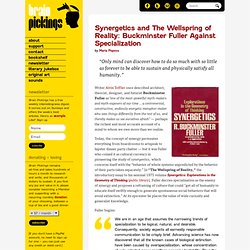

Neurologist Oliver Sacks on Memory, Plagiarism, and the Necessary Forgettings of Creativity. Why I want you to steal my ideas. Please don’t steal my car.

If you drive away with it, I won’t have it any more, which is a real hassle. Please don’t steal my identity or my reputation either. Kirby Ferguson: Embrace the remix. Austin Kleon on 10 Things Every Creator Should Remember But We Often Forget. By Maria Popova What T.S.

Mark Ronson: How sampling transformed music. John Locke on Knowledge and the Folly of Our Borrowed Opinions. By Maria Popova “The understanding, like the eye, whilst it makes us see and perceive all other things, takes no notice of itself; and it requires an art and pains to set it at a distance and make it its own object.”
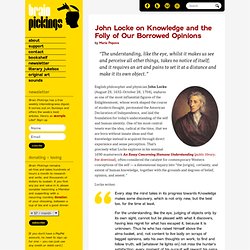
English philosopher and physician John Locke (August 29, 1632–October 28, 1704), endures as one of the most influential figures of the Enlightenment, whose work shaped the course of modern thought, permeated the American Declaration of Independence, and laid the foundation for today’s understanding of the self and human identity. One of his most central tenets was the idea, radical at the time, that we are born without innate ideas and that knowledge instead is acquired through direct experience and sense perception.
Locke writes: Every step the mind takes in its progress towards Knowledge makes some discovery, which is not only new, but the best too, for the time at least. All Ideas come from Sensation or Reflection. Donating = Loving Share on Tumblr. Why Creativity Necessitates Eclecticism: Nick Cave’s Influences and Inspirations. Dy Cruz: How architectural innovations migrate across borders. The Psychology Behind Messy Rooms: Why The Most Creative People Flourish In Clutter. All our lives, we’ve been told to “be organized.”
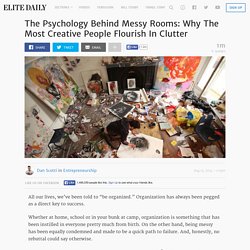
Organization has always been pegged as a direct key to success. Whether at home, school or in your bunk at camp, organization is something that has been instilled in everyone pretty much from birth. On the other hand, being messy has been equally condemned and made to be a quick path to failure. And, honestly, no rebuttal could say otherwise. I mean, what good can come from being disorganized, right? There has always been this sort of “urban legend” that has floated around modern society deeming people with messy desks as having a high affinity for creative reasoning. Sometimes Disorganization Can Lead to Better Creativity. Uncommon Genius: Stephen Jay Gould On Why Connections Are The Key to Creativity. By Maria Popova “The trick to creativity, if there is a single useful thing to say about it, is to identify your own peculiar talent and then to settle down to work with it for a good long time.”
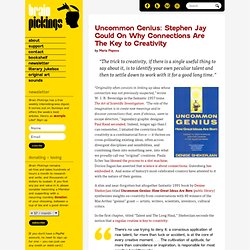
“Originality often consists in linking up ideas whose connection was not previously suspected,” wrote W. I. B. Beveridge in the fantastic 1957 tome The Art of Scientific Investigation. A slim and near-forgotten but altogether fantastic 1991 book by Denise Shekerjian titled Uncommon Genius: How Great Ideas Are Born (public library) synthesizes insights on creativity from conversations with 40 winners of the MacArthur “genius” grant — artists, writers, scientists, inventors, cultural critics. In the first chapter, titled “Talent and The Long Haul,” Shekerjian seconds the notion that a regular routine is key to creativity: My talent is making connections.
It took me years to realize that was a skill. Thanks, Ken Donating = Loving Brain Pickings has a free weekly newsletter. Share on Tumblr. The Curse of Meh: Why Being Extraordinary Is Not a Matter of Being Universally Liked but of Being Polarizing. By Maria Popova “To be universally liked is to be relatively ignored.”
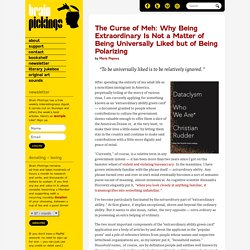
After spending the entirety of my adult life as a noncitizen immigrant in America, perpetually toiling at the mercy of various visas, I am currently applying for something known as an “extraordinary ability green card” — a document granted to people whose contributions to culture the government deems valuable enough to offer them a slice of the American Dream or, at the very least, to make their lives a little easier by letting them stay in the country and continue to make said contributions with a little more dignity and peace of mind. Temple Grandin: The world needs all kinds of minds. The Relationship Between Creativity and Mental Illness.
By Maria Popova The science behind the “tortured genius” myth and what it reveals about how the creative mind actually works.
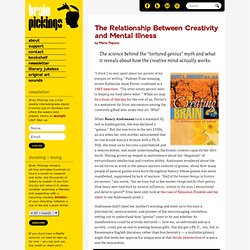
“I think I’ve only spent about ten percent of my energies on writing,” Pulitzer Prize-winning writer Katherine Anne Porter confessed in a 1963 interview. “The other ninety percent went to keeping my head above water.” While art may be a form of therapy for the rest of us, Porter’s is a sentiment far from uncommon among the creatively gifted who make that art. Milton Glaser on Art, Technology, and the Secret of Life. By Maria Popova “You learn more and more that everything exists at once with its opposite, so the contradictions of life are never-ending and somehow the mediation between these opposites is the game of life.” Few things today are truly iconic, but the I♥NY logo is among them. Its beloved creator, the inimitable Milton Glaser — who also co-founded New York Magazine in 1968, and who is one of my most beloved creative and spiritual heroes — is an icon in his own right: often considered the greatest graphic designer alive, a remarkable educator who has shaped lives for more than half a century, a man of uncommon wisdom on art, integrity, and the kindness of the universe.
In this beautiful and wide-ranging interview from The Good Life Project, Glaser offers an unprecedented tour of his magnificent mind and singular spirit. Transcribed highlights below. Synergetics and The Wellspring of Reality: Buckminster Fuller Against Specialization. By Maria Popova “Only mind can discover how to do so much with so little as forever to be able to sustain and physically satisfy all humanity.”
